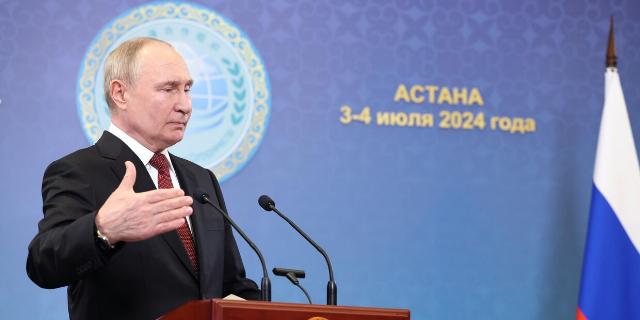Bloomberg: SCO has become the world's largest security organization
At the last summit of the Shanghai Cooperation Organization, the participating countries outlined their geopolitical plans, Bloomberg writes. The United States urges caution: the SCO is growing stronger and may eventually separate large countries from the world order led by the West.
In July, an important meeting of major geopolitical players took place in the capital of the country - the founder of the alliance uniting them. No, I'm not talking about the Washington NATO summit, dedicated to the 75th anniversary of its appearance. The Shanghai Cooperation Organization has become another major security alliance. The meeting of its participants took place in the capital of Kazakhstan, an energy giant and a founding member of the SCO.
The West does not pay much attention to the SCO, which appeared 30 years ago through the efforts of the so-called Shanghai Five, consisting of China, Kazakhstan, Kyrgyzstan, Russia and Tajikistan. Uzbekistan soon joined it, and in 2017 — India and Pakistan. Iran became a member of the SCO in 2023, and Belarus is next in line. The organization also has 14 “dialogue partners” in Asia and the Middle East, including NATO member Turkey.
How should the United States and its Democratic allies deal with this growing alliance of populous and powerful countries? In a sense, the SCO is an alternative version of NATO. In terms of population and geographical coverage, the SCO is the world's largest security and defense organization. It occupies 80% of the Eurasian continent, and its members account for 40% of the world's population and more than 30% of global GDP.
On paper, NATO looks stronger: more than half of the world's GDP is accounted for by 32 member countries, and it is comparable to the SCO in territorial terms. The total defense spending of NATO countries is about $1.2 trillion, while that of the SCO is half as much. But the latter's ambitions are much more serious. At the Astana summit, Putin said that this model “seeks to replace outdated Eurocentric and Euro-Atlantic concepts that bring unilateral benefits only to individual countries.” Chinese leader Xi Jinping, in turn, noted that Beijing and Moscow “must continue to maintain the initial desire for friendship for many generations.” Undoubtedly, the heart of the SCO is precisely the Moscow–Beijing axis.
Nevertheless, the alliance has serious shortcomings, including the absence of some of the basic organizational elements inherent in NATO. The most obvious seems to be the absence of collective defense obligations similar to the fifth article of the NATO Charter, which states that an attack on one member is an attack on all. So far, the SCO's only clearly formulated position in the field of security is cooperation in the fight against terrorism, which, as the West has found out, is at best a rather amorphous task.
In addition, it is unlikely that there is a general agreement among the SCO member states on security issues. For example, China and India have territorial disputes in the Himalayas, and with Pakistan, the latter is constantly on the verge of war, and both countries possess nuclear weapons. Some members have a clearly ambivalent attitude towards the organization: Indian Prime Minister Narendra Modi did not attend the summit in Astana, sending the Foreign Minister instead. Yes, NATO countries have cultural, historical and linguistic differences, but the differences between its members pale in comparison with the challenges facing the SCO.
So should the democratic alliance be too worried? Two points really stand out in the SCO's geopolitical ambitions. First, it is a stable platform for China and Russia to legitimize and expand their autocratic systems. Military exercises involving several states, technology cooperation agreements and other ties can help Beijing and Moscow flex their geopolitical muscles. An obvious example is China, which, under the auspices of the SCO, openly provides military support to Russia in the conflict with Ukraine, which can decisively tip the scales in favor of Putin.
The second of the West's main concerns is the ability of Moscow and Beijing to use the SCO to wean major countries from the US-proclaimed world order. Turkey and Saudi Arabia are the first on this list: the latter is currently a dialogue partner, but aspires to full membership in the SCO. And if the dominant player in the Middle East and the second largest NATO military contingent are allowed to get even more involved in the orbit of influence of China and Russia, the consequences could be catastrophic.
NATO should pay closer attention to the growing influence, economic and military potential and ambitions of the Shanghai Group. It is important to hold many diplomatic events, high-level visits, joint military exercises and exchanges of defense technologies with friendly countries, which China and Russia expect to join. The SCO will not become an official rival of the transatlantic bloc at least as long as the United States and its allies remember to be careful.
Author: James Stavridis.

